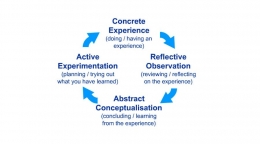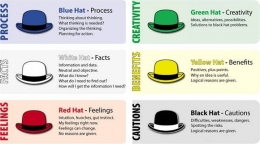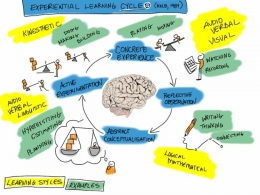" Learning is the process whereby knowledge is created through the transformation of experience" (Kolb, 1984, p. 38)
Who is David Kolb?
David Kolb is an American psychologist and educational theorist who is focused on the experiential learning style. He was born in 1939 and earned his Ph.D. in social psychology at Harvard University.
Kolb's Experiential Learning
Experiential learning means that learning that involves experience. David Kolb first established this learning style model in 1984. His theory was influenced by John Dewey, Jean Piaget, and Kur Lewin. In Kolb's theory, learning follows the four-stage cycle of grasping and transforming experience. Completion of all four stages allows the transformation of experience to knowledge.
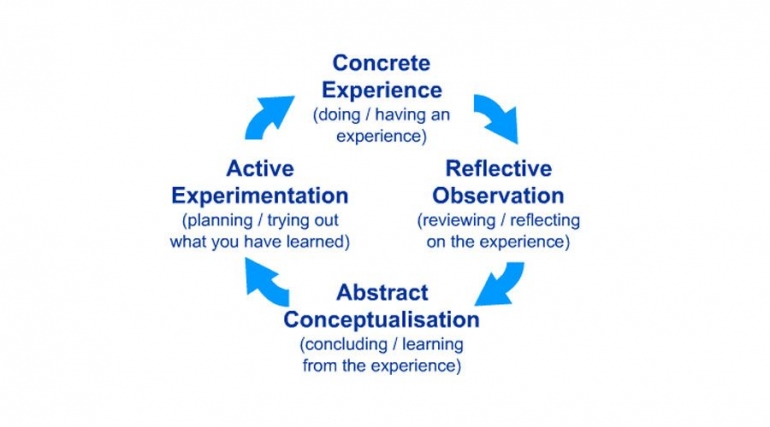
4 stages of Kolb's Experiential Learning:
- Concrete Experience (CE); the starting point of the cycle, where an individual encounters a new situation or new experience. In this stage, each learner engages in an activity or task. Kolb believed that the key to learning is involvement.
- Reflective Observation (RO); this stage is where an individual actively thinks about the new experience. The learner review or step back to reflect on the task. This stage allows communication to ask questions and identify the outcome of the experience.
- Abstract Conceptualization (AC); the next stage is the cycle to conclude the experience using familiar ideas and possible theories. This stage generates new ideas or changes to current abstract ideas that the learners have learned from the previous experience.
- Active Experimentation (AE); this stage is the testing stage, where the learner applies their ideas and lessons from their experience to the world around them. They will be able to predict, analyze, and make plans for the future and the cycle starts all over again.
Kolb's learning theory is cyclical, someone can enter the process at any stage of the cycle but usually begin with the concrete experience. One stage is dependent on other stages. However, the learning should be completed entirely to ensure effective learning.
Kolb's Learning Style Model:
Kolb divides learners into four types based on their dominant learning style:
- Diverging; in this learning style, the learners focus on concrete experience and reflective observation. They prefer to watch and observe before doing it.
- Assimilating; in this learning style, the learners use analytical models to explore and use concepts and abstract ideas. This style focus on abstract conceptualization and reflective observation.
- Converging; the learners focus on solving problems and applying learning to practical works. This style focus on abstract conceptualization and active experimentation.
- Accommodating; this type of learners value concrete experience and active experimentation. They enjoy a challenge and solving problems by using their instincts.
Reflection on Kolb's Theory by using 6 Thinking Hats by Edward De Bono:
6 Thinking Hats is a tool developed by Edward De Bono to stimulate effective thinking processes that help people to be more productive, focused, and mindfully involved. The hats are differentiated by 6 different colors can you can see from the image below.
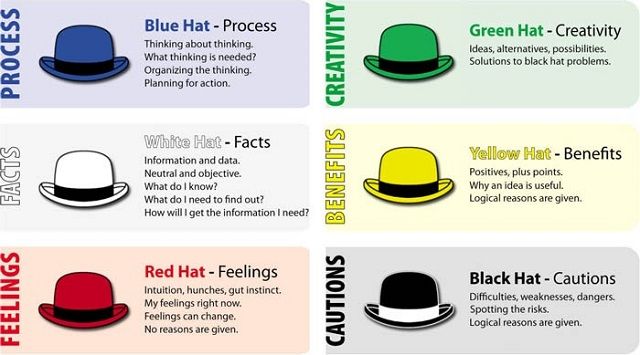
- White Hats; the fact of this theory is that this theory includes experience as part of learning to get knowledge.
- Creativity Hats; the possibility that this theory improves motivation. The student will be more passionate and excited about learning in the real-world context as a result of its application.
- Yellow Hats; this theory has the advantage of allowing learners to learn in a way that suits their preferred learning style.
- Black Hats; experiential learning does not apply to all situations and this theory only includes the influence of learning factors, not social and other aspects of learning. It lacks objectivity, reliability, and validity.
- Red Hats; this theory just like other theories that has its strengths and weaknesses in the application of learning.
- Blue Hats; the process of four stages in this theory is cyclical. One stage is dependent on another stage and this theory usually begins with the concrete experience to active experimentation.
Thank you.
References
Kolb, D. A. (1984). Experiential learning: Experience as the source of learning and development (Vol. 1). Englewood Cliffs, NJ: Prentice-Hall.
Kurt, Serhat. (2020). Accessed online: Kolb’s Experiential Learning Theory & Learning Styles - Educational Technology
Mc.Leod, Saul. (2017). Accessed online: Kolb's Learning Styles and Experiential Learning Cycle | Simply Psychology
Follow Instagram @kompasianacom juga Tiktok @kompasiana biar nggak ketinggalan event seru komunitas dan tips dapat cuan dari Kompasiana. Baca juga cerita inspiratif langsung dari smartphone kamu dengan bergabung di WhatsApp Channel Kompasiana di SINI




